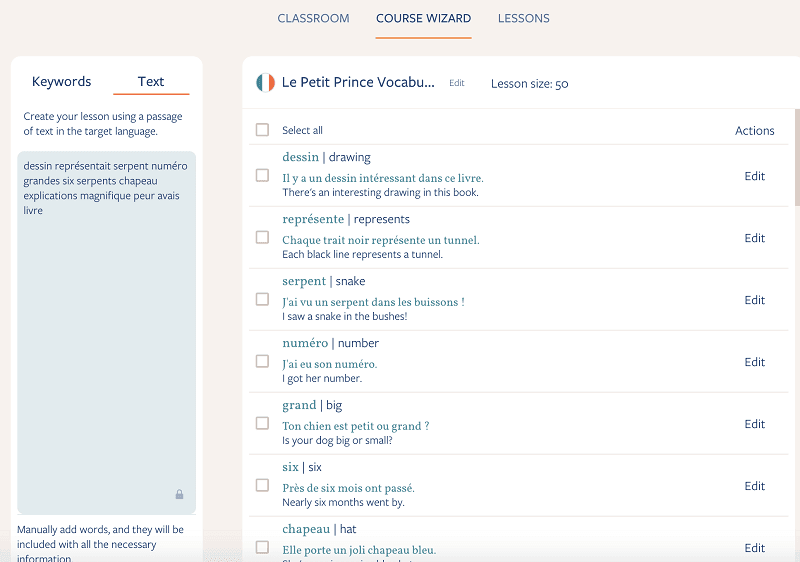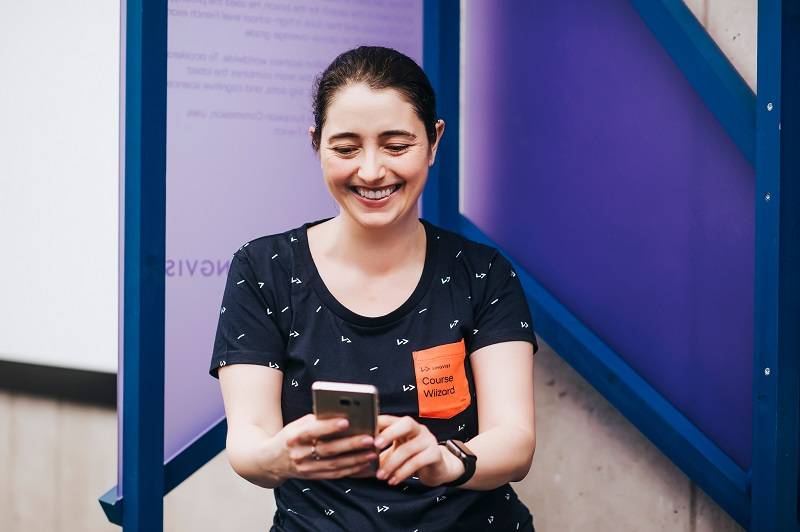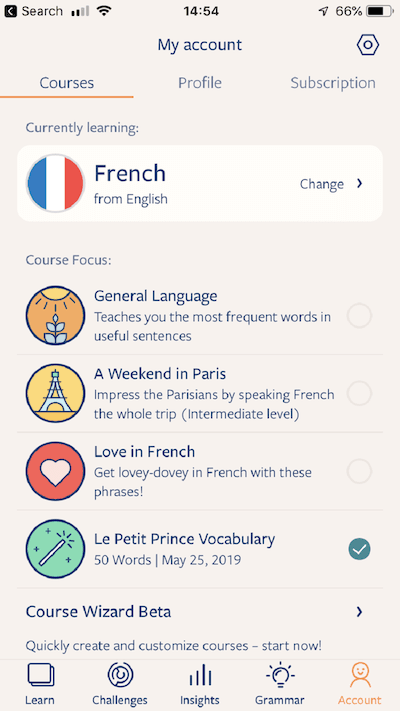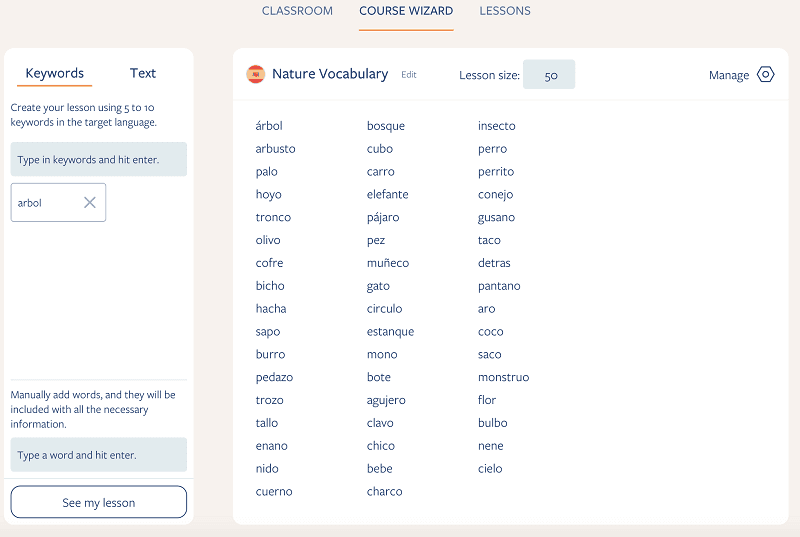The most frustrating feeling when speaking a foreign language is knowing the word for something but not being able to remember it. The “tip of the tongue phenomenon” occurs when we fail to retrieve a word from our long-term memory. Although we can’t guarantee that this will never happen to you again, utilizing the following strategies along with Lingvist’s Course Wizard can help you avoid it in your target language!
What makes a word memorable? The same things that make a moment or experience memorable:
1. emotional impact, such as humor or inspiration
2. unexpected, bizarre, or unusual circumstances
3. context surrounding the event or word
4. sensory input (visual, tactile, or auditory)
5. repetition
6. categorizability
So the trick to memorizing vocabulary is manipulating your learning methods to utilize one or more of these features.

Learn Spanish, French, Russian, or German
1. Emotional Impact
“I’ve learned that people will forget what you said …but people will never forget how you made them feel.” – Maya Angelou
Films, songs, and stories (whether fiction or non-fiction, even those in newspapers) will connect the new vocabulary with a feeling, helping you to learn them faster. A popular mnemonic device for memorization is to create stories in your mind to help you memorize vocabulary. You may want to stick to humorous stories for this one so that you’re not bringing up sad memories every time you use the word!

Apply it!
If you have a list of vocabulary you’re trying to remember, create a longer story with a beginning, middle, and end. Say you’re memorizing the following list of beach vocabulary in preparation for your trip to the south of France:
| English | French |
|---|---|
| the shore | le bord de la mer |
| the sunscreen | la crème solaire |
| the towel | la serviette |
| the wave | la vague |
The following story could help you structure the vocabulary (remember to give the story a plotline, with some sort of occurrence and consequence!):
Beginning: A princess decided to go to THE SHORE because she was so BORED. So she went to le bord de la mer. She was famous in the kingdom for her CREAMY white skin. Her mother’s rule was that any time she felt the AIR on her skin, she had to be wearing SUNSCREEN. So she put on la crème solaire before she left.
Middle: Once she arrived, she noticed a sign which warned of especially large WAVES that day. However, it was very VAGUE and didn’t say which part of the beach was dangerous. So she was walking along when la vague came out of nowhere and got her completely drenched.
End: She was completely wet and upset. She decided never to come to le bord de la mer again, no matter how BORED she was. She called for a SERVANT to SERVE her up a fresh TOWEL. So the SERVANT brought her la serviette right away.
2. Create the Unusual
Your brain is in a constant battle with all of the incoming stimuli to conserve space, only keeping what it deems important. If you’ve seen the popular Disney film Inside Out, you’ll remember the “mind workers” inside the brain going through the many archives of memories and tossing out things that were no longer useful (such as old phone numbers, since they’re stored in mobile phones now). Though it is unlikely that your brain could actually ever run out of space, it is naturally inclined to avoid storing useless information. So, how can you convince your mind workers that foreign language vocabulary is worth keeping around? One method is to smuggle it into long-term storage by wrapping it up in an unusual (and therefore “important”) idea.
Apply it!
Here’s your chance to get creative with your memorization: imagine absurd visuals to help you tie the meaning of a word with its sound or written form. If you’re trying to remember the Spanish word for tree (árbol), you can think of a strange situation in which a pirate (“Arrr!”) is bowling (“-bol”). To tie in the meaning of the tree, imagine the pirate has to bowl between several trees to knock down the bowling pins. To really cement the image, make a quick drawing of it on one side of a flashcard instead of the translation in your native language.


Learn Spanish, French, Russian, or German
3. Context is king
While it may seem more time consuming to practice your target words surrounded by other non-target words, it’s actually more beneficial in the long term to practice your words in context! Plus, you’ll expand your vocabulary with other non-target words at the same time. Not only are you able to remember a word better when it’s situated in a complete thought (because our memories are designed to remember ideas!), memorizing words in isolation is a recipe for sounding non-native because certain words “go together” while others just don’t. Just like studying animal behavior in the wild versus in a lab, additional invaluable information is only accessible through studying words within their naturally occurring “habitat.” For example, though a word like “large” may be a synonym for the word “big,” only one of them will sound natural to a native speaker when placed in front of “mistake.”

Apply it!
Reading books in the language you’re learning is a great way to get exposed to new vocabulary in an authentic context. Start with simple books for young adults or translations of books you know well. If you’re studying a specific book, you can create a course using Lingvist’s Course Wizard to practice specific vocabulary that you’re unfamiliar with. This will allow you to see the words in new sentences, which are automatically generated by the app. Check out the example lesson below, which was created in under five minutes by pasting a passage from Le Petit Prince.

4. Involve your senses
Language itself is a multi-sensory experience, which involves listening (auditory), reading (visual), speaking, and writing (tactile). When memorizing vocabulary, try to always use at least two senses, no matter the method. For example, if you’re reading a book, try reading it out loud.

Apply it!
You can also practice rewriting sentences by hand and underlining, circling, or drawing illustrations (even if they’re not great) for the sentences you’re practicing. Watching a film with the subtitles on allows you to listen and read the vocabulary. You can also listen to a song and read or write down the lyrics. If you’re practicing with Lingvist, the activities already have an auditory component, but try also to read the sentence out loud as you type in the missing word.
5. Rinse and repeat!
Repetition is the most well-known tactic for memorization, and it is not without reason! Just as you’re not in danger of forgetting how to get home after traversing the same route daily over a period of time, if you’ve had enough repeated exposure to a word, you’re not likely to forget it either! The most well-known tactic for repetition-based practice is flashcards, which are easy, customizable, and can be taken anywhere to practice.
In fact, a scientist named Sebastian Leitner who studied memory in the 1970s came up with a perfect flashcard system which took into account an earlier concept of the “forgetting curve,” or how often the average person needed to be exposed to a word to be able to recall it. Unfortunately, the application of his perfect system was too complex for the average person to implement in real life, as it required a complicated re-shuffling of cards and ever-changing increments of time in between practice sessions.
With the advent of technology-based language learning, this system can finally be used! The designers of Lingvist took his and other memory researchers’ findings into account when creating their spaced repetition algorithm, which controls how often you practice a given word. In fact, they took it a step further and made this algorithm responsive to the progress of the learner, so that it adjusts the cards based on whether or not the learner seems to have mastered a word or not.
Apply it!
Now, with the Course Wizard, you can say the same thing about exercises on the mobile app that you can about flashcards: that they’re easy, customizable, and can be taken anywhere! Exercises on the Course Wizard are even easier (and take less time) to create than traditional flashcards. To focus on a certain vocabulary set (a “course”), simply create the course on the basis of keywords or pasted text, select it from your account menu (see the checkmark next to Le Petit Prince below), and start learning with your customized course!


Learn Spanish, French, Russian, or German
6. Birds of a feather flock together
There is a growing amount of evidence in psycholinguistics that rather than long, dictionary-like lists, our brain stores words in something more akin to mind maps or meaning-based (semantic) networks. This may be the reason that words are more easily recalled when they’re grouped together in some way. Information can be categorized based on the meaning or based on superficial qualities, such as spelling (all words that end in -ing) or visual cues. For example, if you’re making flashcards, you can write all of the words in your language in one color and the foreign language in another.

Apply it!
Use the Course Wizard to create a meaning-based course in under one minute! Simply choose one word that’s most representative of your unit to enter on the left side. Once you enter that word, the Course Wizard will automatically suggest other words that are semantically related. You can edit these according to what you want to learn or add additional ones you want to target. It’s that simple!

If you can teach it, you can learn it!
The final method for memorizing vocabulary that we recommend is teaching or explaining to others. The practice of imagining yourself as a student allows you to view the information from a different perspective and categorize the items in a way that makes sense to a learner. But who said the teacher and learner need to be two separate people? You can play the role of both to get double the exposure.
Designing content for a hypothetical other person to learn is an amazing exercise for organizing the information for yourself. Designing a course for yourself using Course Wizard will help you think critically about which vocabulary should be grouped and what types of sentences will be most memorable, and then allow you to add them to your usual Lingvist vocabulary rotation. You can even share it with others so that they can benefit from all of your creative brain power!
Practice makes perfect!
With lots of practice, vocabulary in your new language will become more and more automatically available to you. The catch 22 is that in order to remember vocabulary, you need to use it, and in order to use it, you need to remember it!
Current pedagogical research stresses the importance of creating situations in which you need to actively stimulate memory (active recall), rather than just passively absorbing information. This is why pop quizzes and flashcards are so effective. Luckily, Lingvist activities promote active recall by quizzing you in a new order and new ways (such as multiple choice, speaking the word out loud, and writing the word). Apart from getting you actively involved in learning, this also makes the process more enjoyable because the brain loves novelty!
Employ the above techniques to keep your new vocabulary right there on the tip of your tongue until it becomes second nature (or a second language!). Check out the Course Wizard to start building personalized courses and then share your creative genius with others!




